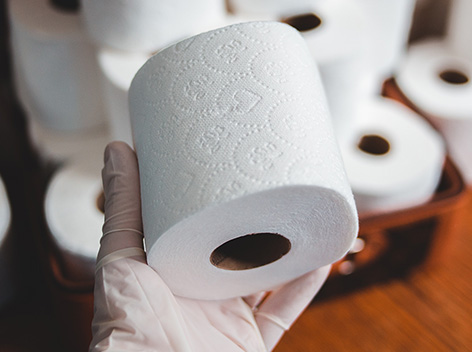
On Needing Toilet Paper, Resisting FOMO, and Leaning Into Mimesis
Facing a Pandemic with Carefully Considered Love.
A few weeks ago, my wife set out to procure more toilet paper. A few hours later, while walking out from the store, she texted me three words: “People are crazy.”
I agree with my wife—people are crazy. But as a psychologist, I rarely think that people are simply “crazy,” and think more about how and why they apparently act crazy. The behaviours that generate social media fodder and fuel our collective tutting are usually not driven by irrationality. In fact, it may surprise you to learn that true irrational behaviour is rather rare.
Animals have long been documented as having “hoarding” behaviours, and if we have been fortunate enough, who amongst us cannot testify to the feeling of security that stems from having money in our bank accounts or food in our freezers? Instead of pure irrationality, this spectacle might better be understood as the actions of people who are afraid of not taking action while they can. In other words, another lens on crazy behaviour is that most of us on some level suffer from Fear Of Missing Out (FOMO).
The mere mention of FOMO might bring a smile to your face because of its lighthearted use in pop culture. Therefore, it may not astonish you that FOMO is not a disorder found in the Diagnostic and Statistical Manual (the “Bible” of psychiatric diagnosis). However, many of my clients have admitted with an ironic smirk that, along with depression and anxiety, they also “suffer from FOMO.” Though it’s often said in a self-deprecating way, I am beginning to understand how FOMO can be debilitating in its own right.
For those who may not know, FOMO describes the tickle of worry that many people consciously experience over their lives somehow not being as fun-filled or rewarding as another person’s life. While jealousy has always been a part of the human condition, in the era of staged social media and over-connectedness, FOMO likely has a larger footprint now than at any other time in history. Put simply, it may be that we are more aware of what neighbours have because they have more avenues to tell us about the good things in their lives.
Of course, regularly snooping on “friends” to see who got a new car or who went on an expensive vacation can evoke feelings of jealousy and personal inadequacy. Perhaps worse, these feelings—that we do not have enough or that we ourselves are not enough—can lead to troubling behaviours. These behaviours fit with the older idea of “keeping up with the Joneses,” which is that if my neighbour has something, I also should have that thing in order to prove my success and fit within that social strata. However, the difference between FOMO and buying a new smartphone is that FOMO is focused on experiences. And since experiences are not so much shared in person as they are in “stories” told online with pictures and video, FOMO leads us to perpetual connection to the experiences of others as shown through social media. This, of course, leads to an upward spiral of increasing consumption and covetousness of others fed by willing algorithms that give us exactly what we want. As Caterina Fake, the co-founder of the picture-sharing site Flickr once commented, “social software is both the creator and the cure of FOMO.”[1]
So what does FOMO have to do with toilet paper? Well, as a social science, psychology tends towards context as a powerful explanatory factor. Since we are in a cultural moment that pits us not against Nazis or terrorists but against an airborne pathogen, one precondition to increased hoarding behaviour is that many of us find ourselves feeling out of control and looking at our neighbours as possible intermediaries of our doom. In other words, there is no “us versus them,” there is only “us.” And meanwhile, even as our reliance upon the prosocial actions of others is highlighted anew, we are deluged with images from around the world of “people being crazy.”
As our level of stress and fear is already high, one could imagine that these images would become the fulcrum on which our fear is tipped forward into action. And what action then seems most accessible? It would not be strange if we heeded that indelible image of scarcity and reacted mimetically: we too seek to remedy the discomfort of holes in our safety net by going after that same product that others reached for in panic. As René Girard once observed, “Man is the creature who does not know what to desire, and he turns to others in order to make up his mind. We desire what others desire because we imitate their desires.”[2]
But why toilet paper? After all, toilet paper is something of a recent invention in human history, and many cultures around the world continue to find other methods of personal hygiene. But perhaps toilet paper is a symbol for what we are truly afraid of losing. Perhaps what we really are afraid of missing out on is the experience of “civilization” and its comforts. When we face an invisible and seemingly implacable foe, especially one that has halted our normal functioning, we fear that this is the how the world ends. As such, we may seek to prop up our flagging confidence that Western civilization will endure. Thus, it may be that the experience we are afraid of missing is that of the prosperity and even excess of our lives.
Frankly, none of us is completely immune to the kind of FOMO that leads to hoarding. So what can be done to develop resilience to this feeling, resisting the behaviours that follow?
Even as there is a mimetic quality to ransacking the toilet paper aisle, mimesis may also be a part of the solution. If we are bound to be imitators in one way or another, what may help us to resist fear is to develop stronger relationships with those who choose not to live out of that fear. And of course, as Christians, perhaps we have underestimated how a strategic imitation of Jesus might look as our online feeds clutter up with arresting images. By remembering Christ’s assurance that he is with us “until the end of the age,” and that death is not an end but a new beginning, we might quiet some of our anxiety.
Even more, as community helps mediate the presence of Christ, it’s worth reminding ourselves that, just like panic can spread in group chats, being with people who can say a gentle “no” to shared madness is formative in all the right ways. Although fear can be even more contagious given means of rapid dispersal through the internet, so also can peace be portioned out in the form of calm assurances that we are not alone, and we will face uncertainty together.
Finally, as I often tell my clients, the antithesis to anxiety is not mindless braggadocio, it is a carefully considered love. So a question we need to ask both now through this pandemic and also for the rest of our lives is, “how can I now love my neighbour?” Though I think showing our love by donating money, time, and materials is valuable, another way that is not often explored is how to love others by “holding” them psychologically. Counsellors have specific training in being able to do this well, but it is something that is sorely lacking in the lives of the laity.
Though nothing can replace a physical embrace, the experience of being held by the unwavering attention of another is one that therapists like me often strive to give to our clients. What this means is that we practice mirroring the pain of others, that we provide non-anxious presences for fear to be expressed, and that we model acceptance of people in their messiest expressions of themselves. The hope of this kind of practice is that instead of responding to the fear of others with further fear or dismissiveness, we provide the experience of surrounding others with a warm, understanding presence.
Soaking in this kind of presence provides a palpable reorientation, reminding us that we need not fear missing out on anything, even “civilization” itself, as in Christ, we have the promise of life unending to experience and explore. So as you wait for our current “not yet” reality to be fulfilled—staying at home, practicing social distancing—you may want to contemplate a kind of embrace that can be effective at any distance. For as we learn to give each other the dignity of deep attention and responsiveness, we remember that our neighbours hoarding toilet paper are victims of the same fear that quavers in all of our stomachs. The promise of realizing the humanity of our neighbours is that we may find the courage and inner strength to love others as we love ourselves. And it may be that this kind of love helps us move from being closed in fear to being open to each other once more.
Looking for another article on caring for others in COVID-19? You might enjoy "Bodily Love: Catherine of Siena on How to Love during a Pandemic."
[1] Wortham, J, "Feel like a wallflower? Maybe it’s your Facebook wall," New York Times, 2011, April 9.
[2] Girard, René. “Generative Scapegoating,” in Robert G. Hammerton-Kelly, ed., Violent Origins: Walter Burkert, Rene Girard, and Jonathan Z. Smith on Ritual Killing and Cultural Formation, (Stanford University Press: California, 1998), p. 122.



